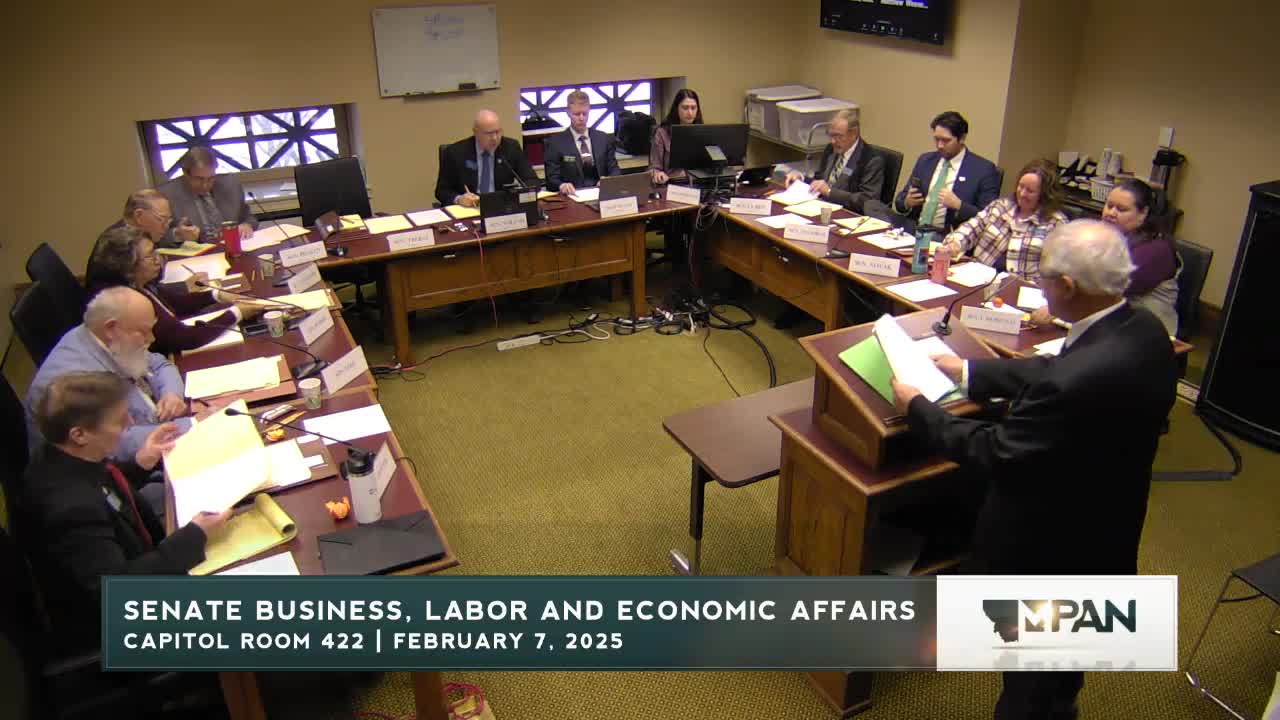Senate committee hears bill to require insurers to cover behavioral-health screenings
Get AI-powered insights, summaries, and transcripts
Subscribe
Summary
Senator Mike Yakawich, sponsor of Senate Bill 244, told the Senate Business, Labor & Economic Affairs Committee that the measure would “mandate insurance companies to cover mental health screening” and described the proposal as a preventive, cost‑saving step for the health system.
Senator Mike Yakawich, sponsor of Senate Bill 244, told the Senate Business, Labor & Economic Affairs Committee that the measure would “mandate insurance companies to cover mental health screening” and described the proposal as a preventive, cost‑saving step for the health system.
The bill would require health insurance plans — including state employee group benefits as written in the draft — to provide coverage for behavioral‑health screening assessments. Yakawich said the screenings are short, standardized questionnaires intended to identify early signs of depression, anxiety and suicidal ideation that can lead to outpatient treatment instead of costlier acute care.
Why it matters: Testimony to the committee stressed that Montana has had among the highest suicide rates nationally for decades and that many people who die by suicide saw a health provider in the month before their death. Supporters told the panel that removing a small out‑of‑pocket charge for screening could increase patient participation and flags clinicians to provide follow‑up care or referrals.
Billings Clinic testimony: A clinician from Billings Clinic told the committee the clinic performed more than 19,000 behavioral‑health screenings in 2024 and that screenings resulted in more than 700 referrals through collaborative care to mental‑health professionals. In anecdotal testimony, pediatrician Dr. Lynn Dykstra of Logan Health said a missed screening can have immediate consequences: she recounted a recent patient whose family declined screening because of cost; two months later the adolescent texted 988 and was taken to an emergency room for suicidal thoughts. “It is possible that this entire episode…and the associated costs could have been averted if this young lady had been able to fill out a free depression screen,” Dykstra said.
Insurer amendments and concerns: Drew Cziok, government relations director for Blue Cross Blue Shield of Montana, told the committee that most of the screenings the bill addresses are already covered without cost sharing on many plans. Cziok said insurers negotiated draft amendments with the sponsor to (1) require zero cost sharing only for in‑network providers; (2) preserve tax‑advantaged health savings account (HSA) eligibility where federal law requires some cost sharing for HSA‑qualified high‑deductible plans; and (3) add explicit inclusion of HMOs, the university plan and state employee group benefit plans in the statutory language. Cziok said the amendments are intended to preserve network value, avoid inadvertently disqualifying HSA plans under IRS rules, and align the bill with existing plan structures.
Opponents and safeguards: Steven Pierce of the Citizens Commission on Human Rights urged caution about universal screening, saying it can overidentify people and lead to unnecessary labeling and medication. Pierce asserted, “there is another side to this,” and said some evaluations of expanded screening have not produced reductions in suicide rates. The committee also heard from Mountain Health Co‑op and other insurers that supported the bill’s intent but wanted technical fixes to ensure the protections apply to in‑network services and to avoid creating unintended HSA consequences.
Committee questions and staff follow‑up: Committee members asked for clarifications about the difference between a screening and an assessment; several witnesses (including JJ Carmody) agreed that language such as “screening and/or assessments” would be a helpful clarification and the sponsor indicated he welcomed friendly amendments. Senator Phelan asked staff for a breakdown of suicide data by age and sex; a witness offered to provide the data to the committee. Amy Jenks, administrator for the Department of Administration’s Health Care and Benefits Division, said she manages the state employee health plan and was available to answer questions about plan operations.
Outcome and next steps: The hearing closed without a formal committee vote. The sponsor and insurers indicated they had negotiated and planned technical amendments to address network and HSA concerns; the sponsor said he would accept friendly amendments to clarify screening versus assessment and to include the state employee plan language.
Ending: The committee record contains detailed testimony from clinicians, insurers and advocacy groups; the bill remains at the hearing stage pending committee amendments and further action.
